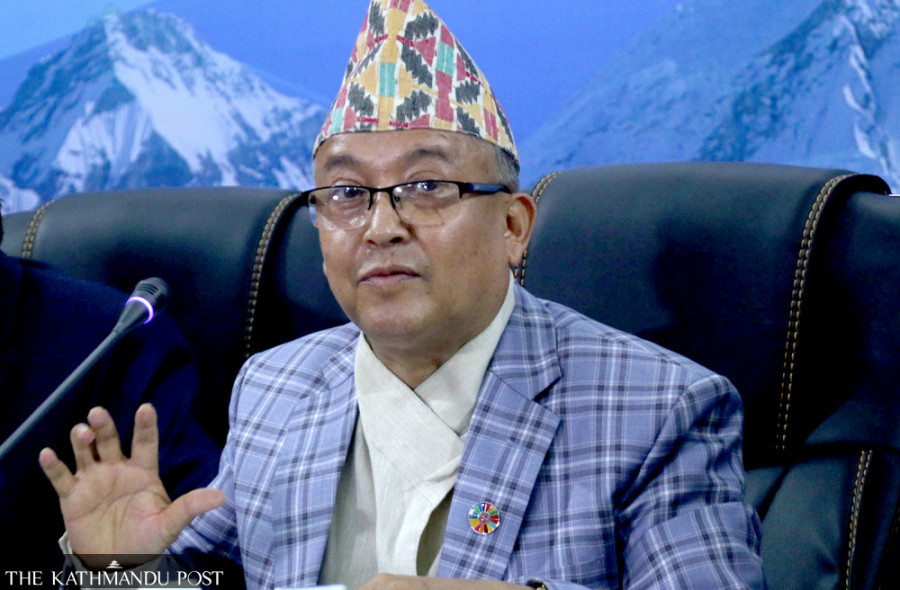National
Poll chief’s statement on Vice President runner creates ripples
Chief election commissioner says the commission will only register candidacy of women from marginalised groups.
Tika R Pradhan
On the eve of the nomination day for vice-presidential election, political parties were struggling to make sense of the Election Commission’s statement that said only women candidates from communities other than Khas-Arya would be registered.
The election body’s statement on Friday has left parties befuddled at a time when the partners of the nine-party alliance have failed to select their common candidate for the post.
Parties will have to register their candidates for the post of Vice President from 9 am to 2 pm Saturday, as per the election schedule. The political parties said they would finalise their candidates by Saturday morning.
Chief Election Commissioner Dinesh Thapaliya said that the election body will register the candidacy of only female candidates from Dalit, Indigenous Nationalities, Muslim, Madheshi or Tharu communities.
However, leaders have started to counter his stance, terming it ‘unconstitutional’.
Article 70 of the constitution states that “election to the President and the Vice President under this constitution shall be so made as to have representation of different sex or community.”
A press statement issued by the commission on the same day, however, reads in line with the constitutional provision.
The confusion emerged after Thapaliya claimed that the spirit of the statute was to have different sex and community as the President and Vice President, as is also the case with positions such as Speaker and Deputy Speaker of the Federal Parliament, chair and vice-chair of the National Assembly, mayor and deputy mayor of municipalities and chair and deputy chair of rural municipalities.
“As the constitution has clearly said different gender or communities, the statement of the Election Commission is unconstitutional,” said Purna Bahadur Khadka, vice-president of the Nepali Congress.
Some leaders of the ruling parties, however, seem to be in favour of selecting candidates as per the Election Commission’s interpretation of the criteria for the President and Vice President.
Maoist Centre General Secretary Dev Prasad Gurung said his party was in favour of fielding a female candidate for the post of Vice President.
The Janata Samajbadi Party in particular was badly thrown off guard by the commission’s decision.
“Leaders at a meeting of four coalition partners namely Congress, CPN (Maoist Centre), Janata Samajbadi Party and CPN (Unified Socialist) agreed to allocate the post of Vice President to our party,” said Ashok Rai, a senior leader of the JSP. “Therefore our party decided to field Ram Sahay Prasad Yadav to the post.”
But the commission’s statement was not the only setback for the JSP. Although the ruling coalition leaders had earlier claimed that they had reached an agreement to award the vice-presidency to the JSP with allocation of the presidential post to the Congress and premiership to the Maoist Centre, leaders now claim no formal decision to the effect had been made.
Congress vice president Khadka, the leader of the nine-party task force formed for the presidential elections, on Friday said there was no formal agreement among the coalition partners on awarding the post of Vice President to the JSP.
“We will come up with a formal announcement on the candidate for Vice President on Saturday morning,” Khadka told the Post. “There won’t be a problem.”
JSP leaders are adamant about registering Ram Sahay Prasad Yadav as their candidate for Vice President. The issue could land in the Supreme Court for interpretation.
“It should be up to the constitutional bench of the Supreme Court to interpret the constitutional provisions,” said Rai, the JSP senior leader and lawmaker. “If the Election Commission refuses to register our candidate, we will have to knock on the doors of the Supreme Court.”
Constitutional experts say the Election Commission’s stance was an extra-constitutional act. What it could have done is request the political parties to field women candidates.
“Our constitution has clearly stated that candidates for Vice President have to be either from a different gender or different community from that of the President,” said Bhimarjun Acharya, an advocate and a constitutional expert. “The Election Commission has no right to interpret the constitutional provision as it likes.”
Asked what would happen if the Election Commission refuses to register male candidates on Saturday, Acharya said that would invite controversy and conflict and the commission would have to take the responsibility for any untoward incidents that might follow.
Another constitutional expert Chandra Kanta Gyawali also has similar view.
He said the parties should file complaint to the Election Commission if the male candidates were not allowed to register their nomination other than Khas Arya.
"If the Election Commission refused the complaint then they can challenge at the Supreme Court," senior advocate Gyawali said.
At least two more parties of the nine-party alliance besides the JSP have announced their candidacies for the post.
The Nagarik Unmukti Party had decided to field its chairperson Ranjita Shrestha for the post of vice president—only to learn that she was ineligible for the post on the ground of age. A candidate must be 45 to be eligible for the post; Shrestha is 39.
Another partner of the coalition, the Janamat Party, has also decided to field its leader Mamata Jha, 53, for the post. Jha was defeated in local elections last year.
The main opposition party CPN-UML has also called its secretariat meeting for Saturday morning to take a decision on a vice-presidential candidate.




 13.12°C Kathmandu
13.12°C Kathmandu














